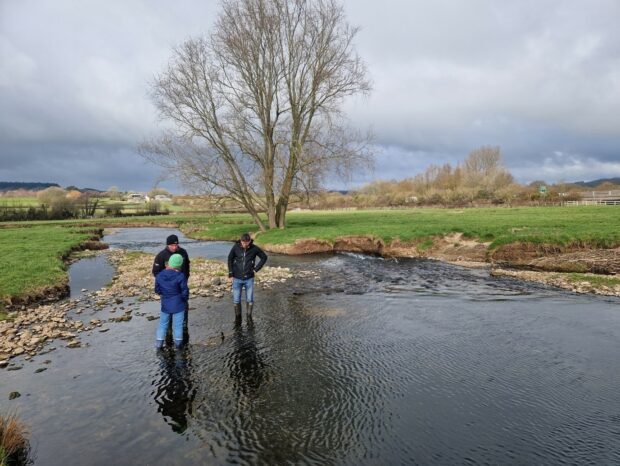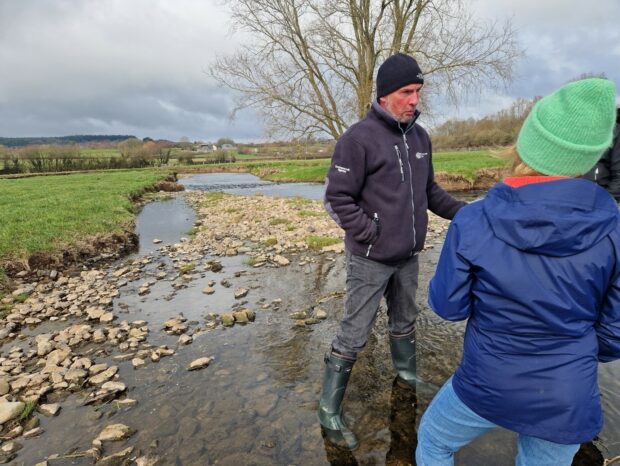
By Nicola Riley, National Agriculture Manager
Regulating agriculture sector
It probably won’t have escaped anyone’s notice that the effects of pollution on water quality are very topical at the moment – and rightly so. The health of England’s rivers and waterways are critical to improving the natural environment for people and wildlife and the Environment Agency’s staff work every day, around the clock, to protect it.
Pollution to water comes from many sources, the main ones being water companies, urban run-off and agriculture. Farming and agriculture are essential to this country for food production, the economy, and the livelihoods of thousands of people. But to ensure it is sustainable we need to ensure the land and water is protected.
Agriculture is the biggest sector the Environment Agency regulates in terms of individual businesses, with around 100,000 premises covering 70% of the land in England. Farmers must juggle multiple technical, competing demands. It can be a heavy load, but the Environment Agency is helping in several ways.
More boots on the ground
New post-Brexit farming policies will incentivise farmers to work with us to enhance watercourses on their land. With Natural England and Defra, we are providing free advice to farmers on how to manage sources of water pollution through the Catchment Sensitive Farming Programme – more on this later.
And last year, we received a share of national Government funding to carry out advice-led regulation on farms to drive improved standards in agriculture and tackle pollution. So far, we’ve recruited and trained 84 new Agricultural Regulatory Inspection Officers to carry out advice-led regulation on farms. They complement our existing Land and Water officers who already regulate agriculture.
The new officers were recruited mainly from agricultural backgrounds, as the ability to communicate with farmers and an understanding of farm businesses is critical to the team’s success in making a difference to the environment. We’ve seen this through the success of the River Axe project which has helped farmers to operate sustainably, protect and enhance the environment whilst increasing their profitability.
The new officers work in assigned river catchments where they engage, inspect, advise and if necessary enforce the Silage, Slurry and Agricultural Fuel Oil regulations and Farming Rules for Water.
Since April 2021, we have undertaken 4,815 inspections and requested 6,169 improvement actions on farm, with 2,791 having already been completed. We aim to perform more than 4,000 site inspections per year, checking and advising on regulatory matters, including nutrient, slurry, and manure management; ammonia emission reduction; farm infrastructure and machinery set-up; and pesticide handling.

Targeted approach
We focus on high-risk locations, previously non-compliant businesses, and those farming sectors of greatest concern.
We work with farmers providing advice and guidance, reflecting individual circumstances, and taking a proportionate approach based on risk to the environment.
If advice is not heeded, we will pursue whatever sanctions are necessary – including penalties, formal cautions or prosecutions. We are currently taking enforcement action against 140 farms.
Range of enforcement measures
We use farm inspections as part of a range of enforcement measures which can include regular audits, remote sensing, targeted campaigns and permitting approaches to ensure compliance with England’s water regulations.
The government has also almost doubled the funding available (to £15 million) to help farmers tackle water pollution via the Catchment Sensitive Farming programme – a partnership between Defra, Natural England and the Environment Agency which provides free 1-2-1 advice to farmers to help them reduce pollution through management of farmyard manure and soils.
The government’s Environmental Improvement Plan (published in February 2023) sets out how it will restore nature, reduce environmental pollution, and increase the prosperity of our country.
It outlines the ‘Polluter Pays Principle’ which will provide a more stable funding base for the Environment Agency as an environmental regulator. The additional funding of £1.3m per year up to 2025 will allow us to continue to pilot methods to improve farmer compliance and environmental outcomes through the Testing Approaches to the Regulation of Agriculture project.
Ensuring clean and plentiful water is one of the biggest challenges we face, and delivering it is one of the biggest gifts we can give to future generations. We are proud of the work we do, which is complex and challenging and requires investment from everyone. It’s a priority for the Environment Agency and government - and needs to be for everyone else, too.
Call to Action: Follow the Environment Agency on Twitter, and sign up for email alerts.

5 comments
Comment by Pamela Lyman posted on
Farmers are only too often blamed for pollution of rivers and watercourses where in fact Highways are to blame. Storm water, silt and heavy metals (waste) from the roads have been delivered into local watercourses for years, heavily silting up ditches, streams and ponds. Will the Government take a realistic view of this and ensure funding with proper SuDS management starting with Godstone Ponds (SSSI's ) which are being lost to road silt and pollution from mineral extraction (sand and oil extraction). The two Reservoirs (Cat B) and many impounded waters which manage the high gradient run off from the North Downs are being placed at greater flood risk due to this mismanagement.
Comment by mark posted on
farmer next to me stores poltry manure on field that washes into the brook, the envirmont agency says that he has a permit and they cant do anthing about it!
His new poultry unit produces more manure than the farmers land can sustain and the local planning authority granted permission regardless -corupt and incompetent
and the farmer is now very rich, so rich that be buys another farm and applys to put up further poultry units !!!
Comment by Robin Gow posted on
Would like too help out if you want..!!!
Regards, RG.
Comment by Melissa posted on
Putting human waste sludge on farmlands is highly concerning, we are breathing in the dust that comes off it for miles around, it absolutely stinks, then it's all over the land we walk through, nature reserve land etc and is getting into the local water. This is absolutely disgusting and should not be allowed!!!
Comment by jen farmer posted on
The point of this is to price farmers out of their land to take it from them using government regulations rather than outright force.